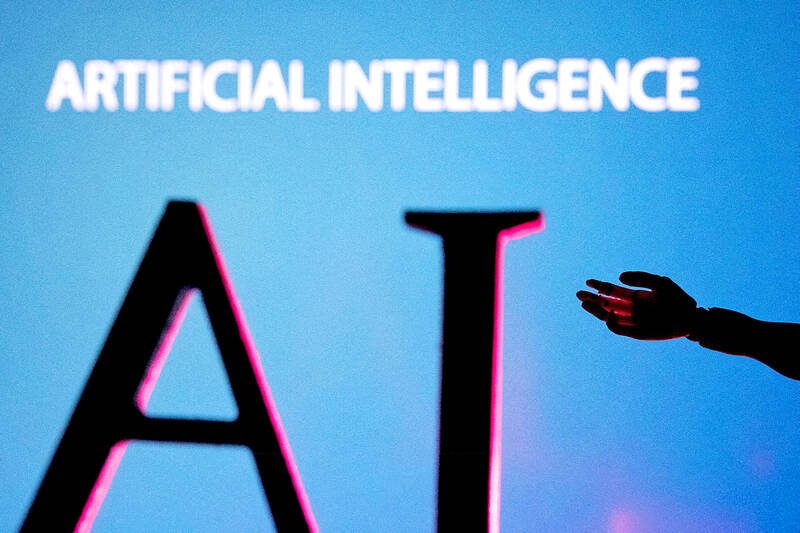The Action Alliance on Basic Education yesterday urged the Ministry of Education to establish ethical norms for teaching artificial intelligence (AI), as the government pushes to incorporate the emerging technology across the education system.
The ministry should prioritize AI education on fighting discrimination and crime, as well as improving learning motivation, rather than focusing solely on technological innovations, the group said in a news release.
The ministry has been implementing AI education at all education levels, including the establishment of the Taiwan Artificial Intelligence College Alliance, which integrates resources from 25 universities to offer cross-school enrollment for AI courses.

Photo: Reuters
It also plans to launch diverse elective AI courses for high schools, and AI competition for junior-high and elementary-school students.
However, ethical disputes arising from AI applications remain and teaching AI without establishing ethical norms would expose students to unconscious biases, privacy risks and potential crimes, alliance chairman Wang Han-yang (王瀚陽) said.
Citing a UNESCO statement published in 2021, Wang said that AI has brought unprecedented challenges, including “increased gender and ethnic bias, significant threats to privacy, dignity and agency, dangers of mass surveillance and increased use of unreliable AI technologies in law enforcement,” but there were “no universal standards to provide an answer to these issues.”
To address these risks, UNESCO in November 2021 announced the “Recommendation on the Ethics of Artificial Intelligence.”
It was the first global agreement adopted by the 193 member states to tackle the ethical issues of AI, Wang said, adding that ChatGPT has been banned by the Italian government since a personal data leak in March last year.
Holding AI competitions without proper guidance and could foster unhealthy competition, where students do whatever it takes to win at the expense of ethics or commit a crime, he said.
For example, a Taiwanese influencer abused the use of AI technology by making deepfake porn in violation of human dignity, he said.
The AI learning gap between urban and rural areas lies more in the learning motivation of students than in an unequal division of resources, as education is a job about people, Wang added.
Educators should think about how to motivate children to learn by interacting with them instead of simply providing digital resources, Wang said, advocating for a shift of mindset from “resource-based” to “motivation-oriented” AI education.

Nipah virus infection is to be officially listed as a category 5 notifiable infectious disease in Taiwan in March, while clinical treatment guidelines are being formulated, the Centers for Disease Control (CDC) said yesterday. With Nipah infections being reported in other countries and considering its relatively high fatality rate, the centers on Jan. 16 announced that it would be listed as a notifiable infectious disease to bolster the nation’s systematic early warning system and increase public awareness, the CDC said. Bangladesh reported four fatal cases last year in separate districts, with three linked to raw date palm sap consumption, CDC Epidemic Intelligence

The manufacture of the remaining 28 M1A2T Abrams tanks Taiwan purchased from the US has recently been completed, and they are expected to be delivered within the next one to two months, a source said yesterday. The Ministry of National Defense is arranging cargo ships to transport the tanks to Taiwan as soon as possible, said the source, who is familiar with the matter. The estimated arrival time ranges from late this month to early next month, the source said. The 28 Abrams tanks make up the third and final batch of a total of 108 tanks, valued at about NT$40.5 billion

Two Taiwanese prosecutors were questioned by Chinese security personnel at their hotel during a trip to China’s Henan Province this month, the Mainland Affairs Council (MAC) said yesterday. The officers had personal information on the prosecutors, including “when they were assigned to their posts, their work locations and job titles,” MAC Deputy Minister and spokesman Liang Wen-chieh (梁文傑) said. On top of asking about their agencies and positions, the officers also questioned the prosecutors about the Cross-Strait Joint Crime-Fighting and Judicial Mutual Assistance Agreement, a pact that serves as the framework for Taiwan-China cooperation on combating crime and providing judicial assistance, Liang

A group from the Taiwanese Designers in Australia association yesterday represented Taiwan at the Midsumma Pride March in Melbourne. The march, held in the St. Kilda suburb, is the city’s largest LGBTQIA+ parade and the flagship event of the annual Midsumma Festival. It attracted more than 45,000 spectators who supported the 400 groups and 10,000 marchers that participated this year, the association said. Taiwanese Designers said they organized a team to march for Taiwan this year, joining politicians, government agencies, professionals and community organizations in showing support for LGBTQIA+ people and diverse communities. As the first country in Asia to legalize same-sex